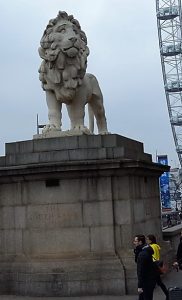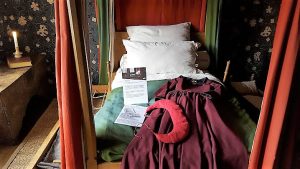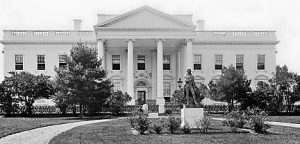
On our last morning to roam London, we got the best tour guide ever to give running commentary on the sights passing by the bus windows. If my memory serves me correctly—which it rarely does anymore–his name was Stuart. He matched from head to toe in shades of green, blue and gray. Even his shoes. I was hoping he would break into song and tap dance down the center aisle of the bus. But he was a proper gentlemen, and they don’t exhibit their choreography on public transport.
At one of our first stops he let us hop off the bus to examine the massive statue of Prince Albert. It was in a beautifully manicured park across the street from Royal Albert Hall. Unlike most people preserved for posterity in the many parks, squares and circles about London, Albert received full Olympus treatment. U.S. General Dwight Eisenhower was honored with a life-sized replica; others were remembered with a head and shoulders bust, and most were in bas relief plaques explaining who they were and why they were honored. But Albert, the royal consort to Queen Victoria and father to so many children I cannot begin to remember all their names, sits high, broad and proud. I do not know if the statue is gold or bronze, but it shone for all to see. This is magnificent memorial of a woman’s love for her husband.
Back on the bus, our elegant guide directed the bus driver past the monument to Lord Wellington. “Does anyone know what Wellington did?”
Josh piped up, “He beat the crap out of Napoleon.”
Stuart appraised my son a moment looked at our long-term guide and said, “I think I like him.”
A little while later we drove by a monument to King Henry VIII, who, Stuart pointed out, “had six wives. Do you know what else he had?”
“Syphilis,” I replied. Now I honestly was not trying to be a smart-ass and ruin the man’s monologue which was filled with wit and wisdom. But Henry did have syphilis and that was why the last years of his reign were so unfortunate for his subjects.
This time Stuart did not miss a beat and went on to explain that King Henry had a difficulty with forming long and loyal relationships. But surely in his mind Stuart must have thought that we two clowns were related. Yes, we are connected genetically and were born without proper filters.

Coming up on the right, he told us, was one of the many lion statues on the banks of the Thames River erected during the reign of Queen Victoria. Upon inspecting it, Victoria realized this lion was quite obviously a male, so she ordered its gender identifying appendage removed for propriety’s sake. When one looked at the face of the lion in question, one could surmise he did not agree with Her Majesty. His eyeballs are perpetually bulging in surprise and discomfort.
At one point we left the tour bus and followed our elegantly dressed Stuart on a saunter through Green Park, a serene space stretching out in front of Buckingham Palace. Ducks and geese glided across the serene surface of its lake. Locals jogged along its backs and lay on the grass, soaking up blessedly warm rays from a late-March sun.
Stuart had our stroll perfectly timed to end at the entrance of Buckingham Palace and the changing of the guard. As a mere former colonist, I thought the changing of the guard consisted of a hand full of soldiers in their bright red jackets and giant black fur helmets; but no, it was a full-fledged parade with horses, drums and rifles.

Stuart was careful to point out these were not just young men and women who were chosen for their proficiency for formal procedures. These were soldiers who had served their country in Afghanistan and where they might serve again in the near future.
When the last soldier had moved on, we broke up into separate groups to explore more bits of English historic lore. This was when had to wave a fond adieu to Stuart. I wish he could have stayed with us, but I am sure he had to address another bus filled with impertinent American tourists.
I really wanted to know who his tailor was, although I was quite sure I could not afford his wardrobe.
Monthly Archives: May 2018
David, Wallis and the Mercenary Chapter Thirty-One

Previously in the novel: Novice mercenary Leon fails in a kidnapping because of David, better known as Edward the Prince of Wales. Also in the spy world is socialite Wallis Spencer, who dumps first husband Winfield, kills Uncle Sol, has an affair with German Joachin Von Ribbentrop and marries Ernest. Each are on the Tanganyika Express to get their hands on the stolen Crown Jewels.Leon kills an agent to save Wallis.
Leon was a bit miffed. When he stabbed the German on the Tanganyika Express, the blood spurted all over his white linen suit. Leon took a detour through Cairo to buy a new one. He remembered Mrs. Ribbentrop years ago commenting on the high quality of Egyptian fabric. Even though he was quite pleased with the purchase, Leon mourned the passing of his first white linen suit.
Back home on Eleuthura, he ran down the dusty road to his hacienda. Jessamine bolted out of the gate and threw her arms around him. She did not comment on his new clothes which bothered him. If she truly loved him, he reasoned, she should have noticed and complimented him. Leon dismissed the thought as six-year-old Sidney raced to him and leapt into his arms.
“Papa! I’m so happy to see you! Let’s play!”
Leon swung him around and Sidney’s legs flew straight out. The boy giggled. Before Leon could toss the boy in the air, Jessamine grabbed her husband’s arm.
“Did everything go all right?” Her brow furrowed. “Pooka said something would go wrong.”
“Pooka always says something will go wrong.” Leon carried Sidney past her to their door.
She scurried behind him. “But something went wrong, didn’t it?”
“I didn’t get paid, if that’s what you mean.”
They entered through the garden to the front door. Leon looked down to see his mother Dorothy on her knees pruning the vegetables.
“Mama, get up.” He kept walking into the house.
“I like your new suit,” Dorothy called out as she struggled to her feet.
The next morning Leon arose early, put on an old ragged shirt and shorts and ate breakfast with Sidney, Jessamine and his mother Dorothy.
“You are a big boy now.” He tousled his son’s hair.
“Yes, I am.”
“When I was your age, my father took me out on his fishing boat. Do you think you would like to go out on a fishing boat?”
“Yes!”
“No, you will not!” Jessamine snapped.
“The boy needs to learn how to earn a living, dear.”
“We are wealthy,” she retorted. “He will not need to fish for a living.”
“Life is unfair.” Leon kept his eyes down as he bit into a scone. “Life is uncertain. What we have today can be gone tomorrow.”
Jessamine looked at Dorothy. “You can’t agree with Leon! Your own husband died on a fishing boat!”
The old woman put her fork down, pushed away her plate and turned to stare at her daughter-in-law.
“My husband was a good, honorable man. He lived for his family. He died for his family.”
“Well,” Jessamine huffed, “Sidney is too young. Leon was much older than six when he first went out on the boat.”
“No,” Dorothy was firm. “Jedidiah was a good man. He would have never let the child do anything that would hurt him, but a man must learn, build his body to provide for his family. Leon knows what he is doing. “
Jessamine pouted. “I shall have to talk to Pooka about his.”
Leon slammed his hand on the table. “You will tell Pooka nothing about our lives! That old witch knows too much about us as it is!” He stood, took Sidney’s hand and marched out the door.
Walking down the path to the Eleuthura dock, Leon waved to a fisherman on his boat. After he tossed the fellow a few coins, he lifted his son into the boat, jumped in and set sail.
“I like the water.” Sidney lifted his head and sniffed the breeze. “I think Mama’s trying to scare me.”
“But you’re not going to let her do that, are you?” Leon tugged on the line.
“No.”
“Do you want to help me cast the net to catch fish?” He smiled at his son.
“Yes!”
After hauling in a load of fish, Leon patted Sidney’s head. “Then you won’t mind working for the man who owns this boat, will you?”
Sidney’s eyes lit. “You mean, Jinglepockets?”
“His name is Nicholas.” Puzzled Leon asked, “Why do you call him Jinglepockets?”
“He’s always jingling coins in his pockets.”
Leon laughed. “That’s good. It’s always good to have coins to jingle in your pockets.” He paused. “Tomorrow you will start going out on Jinglepockets’ boat to learn to be a fisherman. The money you make, give to grandma. She’ll know what to do with it.”
“Does Mama know about this?”
Looking out to the horizon, he shrugged. “No, but don’t worry about it. I’ll tell her.”
“Oh, I’m not worried.”
“Good.”
They cast the net a couple more times and headed back to the dock.
“You know how grandpa died, don’t you?” Leon asked.
“A shark ate him.”
“Does that scare you?”
“Like you said, you do what you have to do to fill your family’s bellies. And everyone has to die. If you die for your family, all is good.”
Leon tossed the rope to Jinglepockets who tied the boat to the dock. The three of them unloaded the fish. Leon and Sidney began to walk away, but the boy stopped.
“What about the fish?”
“They belong to Jinglepockets.”
“Why?” Sidney wrinkled his brow. “We caught them.”
“But he owns the boat.”
“I saw you pay him, so the fish belong to us. Jinglepockets owes us money.”
“You’re a smart little boy, Sidney.” Leon put his arm around his son’s shoulders and guided him home. “Jinglepockets reminds me of Old Joe who taught me many things. He will be your Old Joe.”
The next day, as Leon and Sidney ate breakfast, Jessamine muttered her disapproval the entire time she tossed apples, cheese and bread into the tote bag for their lunch. They walked down to the dock. Leon lifted his son into the boat where Jinglepockets waited for them. When the fisherman cast off, Leon jumped into the boat with them. Sidney looked surprised.
“I thought I was working for Jinglepockets.”
“You are.” His father smiled. “I didn’t say I wasn’t coming along with you.”
They cast their nets as the sun rose in the sky. At noon, they paused to eat their lunch.
“Nicholas, do you know what the boys in town call you?” Leon asked.
“Jinglepockets,” he called out from across the boat. “Everyone calls me Jinglepockets but you.”
Leon leaned into his son. “Do the other boys pick on you?”
“No. One of the older ones wagged his finger in my face one time and called me a name. I grabbed his finger, bent it back and broke it. Nobody bothers me now.”
“Good for you.”
“You taught me that.” Sidney spoke around a chunk of cheese in his mouth. “Strike fast. Hurt them as much as you can.”
“Enough lunch!” Jinglepockets yelled. “Time to fish!”
When they docked that afternoon fish filled the boat. The three of them unloaded the fish from the boat onto the dock. Jinglepockets tossed a coin to Sidney. Leon took his hand and they walked down the road.
“Do you think you could kill a man?” Leon’s voice was soft and somber.
“You kill people, don’t you?”
“Not people. Just men.”
“Why not women? Don’t some women deserve to die?”
“Never.”
Sidney was quiet a moment. “I think I could kill a woman, if she was bad.”
“It doesn’t have anything to do with being good or bad. Sometimes people will pay you a lot of money to kill men. Or steal jewels. Or kidnap old men.”
“That’s how come we have a nice big house, isn’t it?”
“Yes, it is.” Leon considered his thoughts. “Does it bother you?”
“No.” Sidney paused. “There’s a couple of boys I’d like to kill for free. Will you teach me the best places on the body to hit people to make them die fast?”
Leon glanced at the flower pot by the gate. Nothing was askew. “There will be time for that.”
“Papa.” Sidney stopped walking. “If I find something else I’d like to do to feed my family, it would be all right, wouldn’t it?”
“Of course, son. Family is most important.” Leon sighed. “I remember when I came home, you said, ‘Let’s play.’ I don’t think I’ve given you enough time to play.”
Sidney giggled. “Papa, anytime I spend with you is play.”
Ireland and England with Jerry and Josh–I’ve Seen Than Place Before

The movie fan in me had a great time in London. It was like being on the set of an Alfred Hitchcock movie.
Josh and I saw Royal Albert Hall, which like Big Ben, had scaffolding over half of it. Of course that means London is taking care of its architectural wonders so they’ll be around for years to come for American tourists to photograph. Royal Albert Hall was one of the big stars in the Hitchcock 1950s movie The Man Who Knew Too Much. The man in question was James Stewart, and he didn’t know too much. The bad guys just thought he knew too much. The big climactic scene was in the performance hall. When the man clashed his cymbals, a prime minister was to be shot and killed. I don’t want to give away too much in case anyone hasn’t seen the suspense classic, but Doris Day foils the bad guys when she doesn’t keep her mouth shut.

The next landmark featured in a Hitchcock movie was a tall church with an unusual red and white brick pattern to it. I instinctively recognized it but could not remember where. Josh, who was our official photographer of record, quickly took the picture but then went on to his next subject without helping me think of the movie title. It was only after we came home and were watching Foreign Correspondent one night did we make the connection. The foreign correspondent played by Joel McCrea was about to break a big story about German spies in a pre-World War II peace group when an assassin tried to push him off the church tower. The assassin went on to play Santa Claus in Miracle on 34th Street. Now that’s what I call avoiding being type cast.

The third landmark from a movie actually goes back to a famous stage play. I rested in Covent Garden in the shadow of the portico with massive pillars featured in the opening scene of My Fair Lady. If my theatrical trivia serves me right, the same façade is used in the stage versions of My Fair Lady and the George Bernard Shaw play on which the musicals were based, Pygmalion. In the movie and the plays, the building was supposed to be a concert hall, but in actuality it is part of the front of a church.
Now it is the scene of street performers. The entertainer I saw was very talented but he needed some lessons of audience appreciation. First he laid out a red rope at the perimeter of his performance area on the church steps and the cobblestone street in front of it. Woe be unto anyone who walked across the rope once the act began. One woman walked across it three times, and each time the acrobat with the wooden pins and sharp knives became more vituperative (it’s a British word; look it up) when she broke the rules.
“She’s so rude,” he announced to us, “that she doesn’t even know she’s rude.”
And I don’t think she did either. I know I was so scared by this point I didn’t dare scratch my nose. After his big finale I thought we spectators were safe from his acid tongue but I was wrong.
“I’m forty-eight years old and got a family to support here, so you can let go of some change,” he yelled. “Hey you! You mean you’re going to watch my show and walk away? You didn’t even applaud! The least you can do is toss a few coins in my hat!”
I took a fist of coins –I don’t know how much they were worth—put them in his hat and quickly exited stage right.
If Eliza Doolittle had been that aggressive in selling her flowers she wouldn’t have had to take those elocution lessons.
Lincoln in the Basement Chapter Fifty-Five

Previously in the novel: War Secretary Stanton holds the Lincolns captive under guard in the White House basement. Stanton selects Duff, an AWOL convict,to impersonate Lincoln. Duff forms his own opinions about cabinet members, including Navy Secretary Gideon Welles.
Duff paused to look at the executive office second-story window and found Stanton gone. That meant the secretary of war was waiting. He feared what Stanton wanted to tell him. He climbed the service stairs, trying to compose his thoughts. When he entered the second-floor hallway and passed through the etched glass panel into the office, Duff heard Stanton instructing Hay.
“You may have your dinner hour now.”
“But I’ve a couple of questions about my notes,” Hay replied.
“I’ve a private appointment with the president which may last hours.”
“Would you like for me to stay to take notes?”
“I said I want you to leave the building. I’ve been quite clear.”
Duff detected a pause.
“Oh. Yes, sir.”
Entering the office with all the casualness as he could feign, Duff smiled at them. “Ah, Mr. Stanton, you remembered my order to stay for a couple of hours.” Taking pleasure from Stanton’s pinched Cupid’s bow lips, Duff winked at Hay and laughed. “I shouldn’t be too hard on the old man.”
Stanton’s cheeks burned bright red, and Duff flung one of his long, gangling arms around Hay’s shoulders. “I hope Secretary Stanton didn’t try to boss you into forgoing your dinner to take notes on our strategy session.”
“No, sir.”
“That’s good. I’ve noticed Mr. Stanton oversteps his authority by ordering around my personal staff.” Duff laughed again. “You know, he reminds me of the barnyard cock who strutted around the hens, thinking his crowing made the sun rise.”
As Hay chuckled, Duff pushed him out the door, firmly shutting it behind him.
“That,” Stanton said in an angry whisper, “was totally uncalled for.”
“Oh, I don’t know,” Duff replied. “I thought it sounded like something Mr. Lincoln would say.” He sat behind the large oaken desk, hoping to hide his shaking leg.
“Yes, and you know where his arrogance got him.”
“Mr. Stanton, a day doesn’t go by that I don’t think about Lincoln in the basement.” He looked grave. “What do you want?”
“You know very well.” Stanton walked to the desk, planting both fists on it. “What did Mr. Welles say to you?”
“That bewigged, doddering old fool? Merely gossip.”
“Gossip? What kind of gossip?”
“The campaign in Vicksburg will end successfully, possibly today.”
“And?”
“He wants Grant to replace Meade.”
“Why replace the victor of Gettysburg?”
“Circumstances change quickly. Our record of changing generals suggests that trend will continue.”
“You see-it’s futile to keep a secret from me.” Stanton cocked his head to eye Duff. “You’ve another secret.”
“Nothing serious.” Duff stalled Stanton, thinking of some crumb to toss him, something to appease him, something somewhat related to the war—but not connected to Alethia.
“It’s foolish to defy me. Spit it out.”
“It’s something Mr. Hay said. Don’t blame him. He thought he was reporting it to the proper authority.”
“What?”
“He came to my bedroom several months ago…”
“You waited to tell me?”
“I had my reasons. One being concern for your personal life.”
Stanton took a step back.
“As I was saying, he visits me often late at night to share stories he’s heard at some party. I didn’t know social gossip interested you. Besides, it involves someone you know.”
“Who?”
“Jean H. Davenport Lander.”
“Don’t believe gossip.” He shuffled his feet. “I was between marriages when Jean and I—enjoyed each other’s company. This was before she married Colonel Lander.”
Duff gained confidence; for once, he held the upper hand. Smiling at Stanton, Duff was certain he saw beads of perspiration across his brow.
“Mr. Hay, it seems, talked to her at this party.”
“Go on.”
“She seemed concerned, he said, about a young Virginian she had met who boasted of a great, daredevil thing.”
“A daredevil thing?”
“What if he were planning an assassination?”
“That’s highly unlikely.”
“I thought, how ironic if I were killed instead of Mr. Lincoln.”
“Did she mention his name?”
“I don’t know.”
“If Mr. Hay mentions it again, tell me.”
Before Duff responded, office messenger Tom Cross rapped softly at the door and opened it. He timidly stepped in, his eyes wide with apprehension.
“Yes, Tom. What is it?” Duff asked.
“We just received a message from the Soldiers’ Home.” He paused to swallow hard. “They want you to come immediately. Mrs. Lincoln’s condition, it’s worse. She’s got a fever and is in and out of consciousness.”
Burly Chapter Eighteen

(Previously in the book: For his fifth birthday Herman received a home-made bear, which magically came to life when Herman’s tear fell on him. As Herman grew up, life was happy–he liked school and his brother Tad was nicer. But mama died one night. Papa decided sister Callie should go live with relatives. Tad tore up the burlap bear Mama had made for him.)
In the ensuing, hard depression years, Herman and Tad never talked about what happened to Burly Senior. And, curiously enough, neither did Herman and Burly. From time to time one or the other would wonder what Callie and Pearly Bear were doing, but they never mentioned Papa Bear.
Herman found he liked school very much; in fact, he was very good, always making the best grades in his class. He was very proud of this and bragged to Burly all the time, but he never mentioned it around Tad, for his grades, while not bad, were not the best. Papa never commented on any of his sons’ grades, just writing his name on the cards and sending them back to the school.
“Sometimes I wish papa would brag about me some,” Herman said with a sigh one day after he had taken his report card home. “It would make me feel good.”
“But that isn’t your father’s way, is it?” Burly asked. “So why wish for something that your head tells you will never happen?”
“I suppose you’re right,” Herman replied. “It’s just that the grades make me feel so good. I know I’d feel even better if papa was proud of them.”
Burly was strangely quiet. Finally Herman noticed the silence and looked down at Burly. “Is anything wrong?”
“I think you’re putting too much importance on that report card.”
“What do you mean? Isn’t doing well in school important?”
“Of course,” Burly said. “But have you noticed you only seem to like yourself a lot after you get your report card?”
Herman frowned. “I like myself all the time.”
“I don’t think so.”
“Well, maybe I like myself better after report card time,” Herman admitted. “After all, there it is, in black and white. Herman Horn is smart and he behaves well in school.”
“But one of these days you won’t have it in writing every six weeks how good you are,” Burly debated. “And it will be up to you to like yourself without any help.”
Herman thought a moment and then laughed. “Burly, you’re funny.” Then he forgot about the whole thing.
But Burly didn’t forget it. He knew that Herman was in for some hard time, and he didn’t know how to help him see it. Burly didn’t know how he knew it; after all, he was only a stuffed burlap bear, but he knew it as surely as he knew his papa had disappeared and he might never see his mama again.
Christmases didn’t come to Herman’s house anymore after Callie left for Houston. He didn’t bother to make a card for papa and he didn’t even mention the holidays to Tad. He did talk about it to Burly late at night, and on Christmas Eve he and Burly sang carols softly to themselves. Herman laid back and imagined how Christmas would be one day when he was the papa and he had children of his own.
“No matter what happens,” he whispered to Burly, “I’ll always make Christmas special for my children.”
“I know you will,” Burly replied, cuddling close to him, fantasizing how nice Christmas would be with Herman and his new family, naturally fantasizing that he would be a part of it.
Another numbing year passed, and Christmas was coming upon Herman and Burly again. The now twelve-year-old boy had come upon some red material on the side of the road and was figuring out how to make a hat or coat out of it for Burly. Maybe a muffler, he thought. He was playing with the piece of cloth one Saturday night in the loft as papa and Tad sat downstairs looking at the newspaper. In the last couple of years they had grown closer together as Herman and Burly had grown closer. Herman looked over the edge of the loft at them discussing the world and felt no twinges of jealousy or sadness. He just accepted the fact that papa had found comfort in his nineteen-year-old son.
“The Japs are in Washington talking to the government,” Tad said.
Papa grunted.
“I don’t trust them,” Tad added.
Papa grunted.
“I’d like to kill all of them.”
Herman put the cloth aside, deciding it would best make a muffler and plopped into his bed, gazing out of the window at the cold black sky and the twinkling stars.
“You always eavesdrop on their conversation until one of them says something bad about someone or something else you don’t like,” Burly observed.
“Is that what I’m doing?” Herman frowned. “Eavesdropping? I just thought I was watching my family.”
“Think real hard about it.”
“I guess I am,” Herman confessed with a sigh. “But what’s so bad about that?”
“Nothing, as long as you know that’s what you’re doing.”
Ireland and England with Jerry and Josh–Touring Crazy Town

If you are going to one of the most exciting, eclectic cities in the world, go ahead and jump out of the bus into the heart of crazy London town and go for it.
The tour bus dropped us in Piccadilly Circus, and the guides told us to try to keep up. I knew immediately this was going to be difficult because how can you follow two typical English people in a crowd of a hundred thousand typical English people.
For the first thing, I was distracted by this building that had four gorgeous bronze statues of young nubile naked women diving into the center of Piccadilly Circus. Perpetually with their arms extended, up on their tippy toes, backs straight, tummies tucked in and chests proudly puffed out. I may be 70 years old but I’m not dead. By the time I realized I was supposed to be following the group, they were already across the street.

This presented me with my second problem. By nature I am always the one to step back with a smile and allow the cross pedestrian traffic to proceed. I have been known to hold open a door so long, people thought I worked for the store. If I did that in the middle of Piccadilly Circus, I would lose sight of my group and never see the Spanish moss draped live oak trees in downtown Brooksville, Florida, again. Then I remembered the grumpy old Irish woman with her walker in Dublin. I put a scowl on my face, hunched my shoulders and bulled my way forward. Before I knew it I was back with my group and I don’t think they had realized I had gone away.
This was very important to me. I’m old enough to be the grandfather of the young people on this student tour. The last thing I wanted was to have them interrupt their good time to see if the old man was lost, gasping for air, or fallen over with a heart attack. I didn’t want anyone to say, “Somebody call 9-1-1 and get the old geezer off our backs.” (Okay, they were all nice polite young American citizens and they would have never said that—thought it maybe. It’s a joke.)
Speaking of jokes, on the other side of Piccadilly was a street performer who looked just like Mr. Bean and for a modest price you could have your picture taken with him, hug him or pinch his bum. Twenty years and fifty pounds ago I was told I looked Mr. Bean. If I had moved to Piccadilly back then, think of the money and I could have made, and the bruises. Never mind.

Finally we arrived on Carnaby Street where the tour guides told group members to be back in two hours to eat at an authentic English restaurant featuring Indian cuisine. First Josh and I walked down the street to the largest toy store in London. The entire basement was filled with Star Wars stuff. My son Josh, by the way, goes to Star Wars convention everywhere, so he was in hog heaven (an old Texas expression). I, on the other hand, had reached the end of my tether and decided to go back to Carnaby Street while he explored the other three floors of toy heaven.
For the first time that day I felt entirely in my element. I ordered a nice lemonade, sat on the café patio and watched beautiful people go by as though they were on a runway. Unattractive people were beautiful in their high fashion clothes and perfect hairstyles. Even the boys. I wanted to see Twiggy walk by. Beatle tunes lingered in my brain. Everything was the same as when I was a teen-ager in Texas, except nothing was the same. I was old. And all the fashionable folk had smart phones stuck in their ears.

After dinner, the tour guides took us on one last marathon hike through Wellington Circle, past the National Museum and an establishment called Sherlock Holmes Pub. The tour guide said he used to work there. Finally we arrived at the Millennium footbridge over the Thames River where you could see the Eye (big Ferris wheel whose lights were down for the night) and Big Ben (which was covered in scaffolding and couldn’t be seen even if the lights were on.)
Don’t get me wrong. I had a great time. Who gets to walk the streets of glamorous London at night and not get lost? I didn’t have a heart attack. For someone my age that’s a great confidence booster.
David, Wallis and the Mercenary Chapter Thirty

Previously in the novel: Novice mercenary Leon fails in a kidnapping because of David, better known as Edward the Prince of Wales. Also in the world of espionage is socialite Wallis Spencer, who dumps first husband Winfield, kills Uncle Sol, has an affair with German Joachin Von Ribbentrop and marries Ernest. Each are on the Tanganyika Express to get their hands on the stolen Crown Jewels.
Ernest Simpson was such a nice, decent and easy-going husband, Wallis thought as she boarded the Tanganyika Express in the heart of Africa amidst dreadful plains which seemed to go on forever. The sky was dark, like it was going to storm again soon. Her mind went back to her husband. It was a shame that she did not love him. He was reasonably good looking, an excellent dance, an understanding, giving lover, and not at all clinging or overly inquisitive. But when MI6 contacted her for a mission, she was required to go. For instance, when she was notified of her latest assignment she was in a fitting at her favorite London designer. A note was slipped into the bodice of her new gown.
“Noon. White Chapel. Queen Betty’s Fish and Chips.”
Wallis thought it humorous to rendezvous in the district known for its ladies of the night and Jack the Ripper. A waiter seated her in a booth in the back by the kitchen. Within a few minutes an old man sat opposite her.
“The crown jewels have been stolen.” He had a thick Cockney accent.
“Don’t look at me.” Wallis puffed on her cigarette. “If I want jewels I just sleep with a man and then he gives them to me.”
“We know who stole them.” The old man pushed an envelope across the table toward her. “Be on the Tanganyika Express. Walk by the designated compartment at midnight. A door will open. A hand will appear and will drop a velvet pouch in your purse. Immediately return here and give the pouch to me.” He tapped the envelope. “The tickets, everything you need to know, are in here.”
“I don’t get to kill anyone this time?”
“If you’re lucky. Maybe. Take your knife.”
That evening in their Bryanston Court apartment over a small supper comprised of soup, mashers and bangers, Wallis announced to Ernest she was leaving in the morning for Africa.
“One of my girlfriends told me of a witch doctor living in the wilds who claimed a cure for heart disease. I must dash off, obtain the herbal potion and rush to America to administer it to mother. After all, when we visited her recently she looked dreadful.”
“Didn’t she also inform you your brown dress looked dreadful?”
Her hard slit of a mouth turned up in a passing imitation of a smile. “Ernest, darling, you are way too sensitive. You must learn to live and let live. Forgive and forget.”
Ernest stood, picked up his dishes and those in front of Wallis to carry them to the kitchen. “I’ll write you a check before you leave tomorrow. You must always travel in comfort, even if you are on a mission of mercy.”
MI6 had issued all the funds she needed for the assignment, so she used the money Ernest gave her to drop in at Paris on her way. She had decided to take the route to Cairo, down the Nile and make the connecting trains to the Tanganyika Express. The Express had the reputation had a reputation of serving only the elite of European society. She wanted to fit in. In Paris shops she bought a black velvet hat with a brim so wide it dropped in front, covering both her eyes and nose. It revealed only her crimson lips. The crown concealed a giant pin to serve as a back-up weapon if she couldn’t get to her knife fast enough.
Her leopard skin coat had giant deep pockets in which to hide the crown jewels. A thought wafted through her brain that if the authorities did not have an exact count of missing diamonds she could sneak one away to squirrel into one of the dark crevices of her leopard coat pockets. They probably did count them, Wallis decided. Damned insufferable English efficiency. It was for the best anyway. They took only the small jewels and who wanted a small diamond even if it were part of the royal jewel collection?
The Nile proved tedious to Wallis. Just a bunch of dirt and mud buildings. Even the ones shaped like pyramids. All the good stuff had been taken out of them. She did catch up on her sleep. Wallis led a very active life and every now and then her body would beg for an extended sleep, which on this trip she has able to provide. When she reached the headwaters of the Nile she connected to a train which took her to the station where she could board the exotic Tanganyika Express.
Wallis’ dining experience on the Tanganyika Express was boring. No man offered to sit with her. Probably was the huge hat. Just as well. MI6 gave her strict orders not to be identified. The worst part of the evening was observing Mrs. Barnes, wife of the British ambassador. The middle-aged woman had not one socially redeeming quality—she was dumpy, her unattractive clothes did not hang well on her body, she wore too much makeup and her table manners were atrocious. She was a nymphomaniac which made her a prize above measure for men. At least three sat at Mrs. Barnes’ table during the meal. The first was a tall German gentleman with blond hair and impeccable manners. Wallis turned her head to eavesdrop on the conversation. She could not understand a word he said but she nearly swooned at the guttural tones emitting from his throat. A well-dressed young black man passed the table a couple of times. He wore a lovely white linen suit. Wallis could tell he was interested in talking to Mrs. Barnes but as long as the German sat there wooing her, he continued his exploration. Wallis felt it was an intelligent decision since interrupting the German could Start World War II in an inconvenient space.
After he seemed to give up the cause, the well-dressed black man left the dining car. Wallis could not help but follow his departure. Her attention quickly was drawn back to the Barnes table where she had shrieked something unintelligible, stood by table facing a sandy haired gentleman who had a slender frame. She decided the man had a certain élan which made him more fascinating than the German. Wallis was right. Within a few moments the German stalked away, allowing the remaining gentleman to sit, lean forward and begin whispering sweet nothings to the ambassador’s wife. Suddenly the thought struck her that Mrs. Barnes was the one with the diamonds. Who would be dumb enough to trust her with the stolen jewels? They parted and exited at opposite ends of the dining car. Wallis never saw the man’s face. All she could determine was that he carried himself as though he knew he was better than anyone around him and he was comfortable with that fact.
One of those three men would open Mrs. Barnes’ compartment door at midnight and drop a pouch of diamonds into her purse. Which one she did not know, nor cared. She looked at her watch. An hour before midnight. Wallis had time for a nightcap in the lounge car. When she entered she saw Ambassador Barnes in a corner with a group of men. Wallis sat close to them so she could hear their conversation.”
“This is my last one.” A man announced. “I am passed my bedtime.
“Oh God no,” Barnes slurred. “Please stay and be my excuse for returning late to my wife.”
“And why is that?” another man asked. “I thought your wife to be—“he paused awkwardly to come up with the right word “—sweet.”
“My God,” Barnes muttered, “that’s the bloody worst thing you could say about a woman. Heaven’s sake, she is. Sweet, that is. I want to wait until after midnight. Hopefully she will be asleep by then.”
That’s good. That way he won’t be in the middle of some messy political intrigue. She took her time sipping on two martinis until the clock neared midnight. As the hands of the clock were straight up, the Tanganyika rains returned. Sauntering out and into the sleeping car, she saw a compartment door open and a man’s arm, sans shirt, extended out with a small velvet pouch. As she walked by, she opened one of the wide pockets of her leopard skin coat and the pouch dropped in. She kept walking at an even pace and exited the sleeping car and, trying not to be pelted by rain, was about to enter the next when the door opened behind her and Wallis felt a power arm around her neck. Wind caught her broad brimmed black velvet hat and carried it out to the dark African countryside. The German looked around into her face and smiled.
“Herr Von Ribbentrop will be surprised to learn you were involved in this.”
Before he could say or do anything else, Wallis yanked her knife from her purse. The German went limp which gave Wallis a chance to twist around and cram the knife up under his ribcage. As the German fell, a crash of thunder accompanied a flash of lightning which revealed another knife was stuck in his temple. She quickly stepped aside and allowed the body to fall from the train and into the darkness. Wallis was surprised to see the black man in the nice white linen suit step forward. His right jacket sleeve was splattered by the German’s blood.
“I don’t believe in killing women,” he said in a Bahamian accent.
“I can take care of myself.” Wallis tried to figure out how to extract herself from the predicament without losing the diamonds.
“Don‘t worry. You can keep the jewels. I didn’t need the money from this job anyway.”
Wallis smiled and pursed her thin lips. “In that case, thank you.”
Ireland and England with Jerry and Josh Stratford-on-Avon Except We Never Saw the Avon

I always like me some literary insight while I’m having fun.
Our tour bus stopped at Anne Hathaway’s cottage in Stratford. We had to wait in line because we arrived a little before they unlocked the door. We could have been distracted by beautiful blooms in the garden but the plants hadn’t budded yet.
I think everyone has seen a picture of the Hathaway house but we took one anyway. Yes, it has a thatched roof. Yes, it is a long two-story house. Yes, it is bigger than you thought, but not that big. For the sixteenth century it has a lot of nice things, including beds.
Speaking of beds, the guide explained the whole thing about how William Shakespeare left his wife his second best bed in his will. Admit it, we all thought Will was a cad for leaving his wife the second best bed. Just like most sound-bites in history, there’s much more to the story.
Back in those days, there weren’t very many inns in the countryside, and many people in the country, whether they liked it or not, had to take the trip to London once in a while and had to stay somewhere along the way. To make a little money, most people rented out a bed to weary travelers. And which bed would you want a stranger with money to have? The best bed in the house, of course, so it had to be empty and clean at all times just in case someone knocked at the door.
So the head of the family used the second best bed, which probably was the marriage bed. A romantic gesture to leave to your wife, when you think about it. Also a financially sound one too. The best bed was still available to rent out to travelers, which continued to be a source of income for the widow.

We also thought Will was some illiterate ragamuffin who spied the girl in the big house down the road and decided to marry her. Then we saw his birthplace house. It wasn’t all that small. His father was a successful tradesman, so the ragamuffin theory went out the window. We did see the bed where Will was born and it was as nice as any bed in the Hathaway house. Both houses had lovely gardens.
Josh and I walked a few blocks away to the site of the house that Will built for Anne. It had burned down and the lot is now a playground with a nice marker in it. Will always said, “The play’s the thing….”
This is when I realized why Will left his family in Stratford when he went off to work in theater in London. If you had a choice of living in a pretty country town with a nice house and garden or in rat-infested, plague-ridden London with all sorts of unnamable waste in the street, wouldn’t you want to be in Stratford too?
So instead of being this lowlife scum who abandoned his poor family for a glamorous show biz life in the big city, he left them safe and happy among friends and family to try to make a living from the only talents he had, writing and acting. And he could only do that in London.

After I got mired down into university course Shakespearean Tragedies 303, I saw a statue of a court jester in the middle of the street. Will had a buddy in his acting troupe who was really funny so he wrote a role for him in every play, whether it made any sense or not.
To get into the spirit, I had Josh take a picture of me trying to imitate the pose of the jester who had both hands in the air and one leg up. But I lifted the wrong leg so it didn’t make any sense at all.
Mission accomplished.
Lincoln in the Basement Chapter Fifty-Four

Previously in the novel: War Secretary Stanton holds the Lincolns captive under guard in the White House basement. Stanton selects Duff, an AWOL convict,to impersonate Lincoln. Duff forms his own opinions about cabinet members.
As the Cabinet members left, Welles turned to Duff.
“Mr. President, would you walk with me to the gate?”
“No,” Stanton interjected. “He’s much too preoccupied.”
“I’m not preoccupied at all.”
“Good,” Welles replied, taking Duff by the crook of his arm and leading him down the hall. “How’s Mrs. Lincoln after her carriage accident?”
“Very well,” Duff said, ignoring the exasperated grunts from Stanton behind them. “Doctors at the Soldiers’ Home said her head injuries were minor. It’ll be good for her to recuperate in the cool Maryland foothills.”
“Yes, it can be quite sweltering in Washington during the summer months.”
They began down the grand staircase.
“You know, Mrs. Welles always inquires about Mrs. Lincoln. She’s quite fond of her. Often she has protested the unfair attacks on her in the newspapers.”
When they reached the foyer, Welles gave a wary glance up the stairs and then at the front door guard, John Parker, who was already red in the face from drinking.
“Good morning, Mr. Parker,” Duff said. “I’m escorting Mr. Welles to the gate. I won’t be long.”
“Very well, sir.” Parker’s voice was thick with whiskey.
As they walked down the steps, Welles leaned into Duff.
“I wanted a private word with you, Mr. President,” Welles said in a hushed voice. “It seems Mr. Stanton has been omnipresent the last few months.”
“Really? I hadn’t noticed.” Duff raised an ingenuous eyebrow.
“Mr. President, I wish I had your gentle wit.” Welles chuckled and shook his bewigged head.
They took a sharp turn to stroll through the garden to the turnstile gate.
“What’s on your mind, Mr. Secretary?”
“I was less than forthcoming during the Cabinet meeting,” he whispered. He stopped to examine a rose bush. “I wish I still had my sense of smell. Roses have a marvelous bouquet.” Again Welles looked up, this time at the second-story window, where Stanton stood glaring at them.
“I assume you weren’t forthcoming because of Mr. Stanton.”
“I don’t trust him.” Welles straightened and looked at Duff. “He exudes the aura of frustrated ambition. Put quite bluntly, Mr. President, he covets your job.”
“So do Mr. Chase and Mr. Seward.”
“But not as much as Mr. Stanton.”
“So what do you want to tell me?”
“I’ve my sources at Gettysburg,” he whispered as he gripped the top of the turnstile gate. “On both sides. I don’t want Mr. Stanton to know.”
“What is it?”
“On the Confederate side, my sources say General Lee isn’t well.”
“I’m sorry to hear that.”
“It’s his heart,” Welles said, leaning into Duff. “His appearance indicated a heart attack. If that’s so, his judgment’s impaired. He’ll make mistakes. His decision to attack Little Round Top was disastrous. There’s no question his decision to charge the center of the Union line today will be an unequivocal failure.”
“So that’s good for us, correct?”
“Not necessarily. My sources on our side tell me General Meade errs on the side of caution to the extent he won’t pursue Lee when he retreats.”
“That wouldn’t be good.”
“Your understatement is amusing,” Welles said wryly. “You—we—will need a replacement for General Meade.”
“Of course.”
“Before Mr. Stanton makes his suggestion, I’d like to recommend General Grant.”
“But he’s mired in the Mississippi mud outside Vicksburg,” Duff said. “And my sources tell me he’s disappeared in the bottle.”
“My sources,” Welles said, shaking his head, “which I assure you are faster and more accurate, say Mrs. Grant arrived in camp, and the drinking stopped.” His mouth went close to Duff’s ear. “They also say he’s close to a great victory. Vicksburg’s capitulation may come as soon as tomorrow.”
“Thank you for your information,” Duff said, glancing over his shoulder to the second-story window, where Stanton still glared down upon them. “I’ll consider your recommendation of General Grant most seriously—as I’ll consider nominations from other Cabinet members.”
“Don’t let Stanton sway you.” Welles grabbed Duff’s arm. “He’s one of that breed who believes it’s impossible that he could be wrong, therefore any action he takes is justified.”
“We all, at one time or another, have to fight such delusions,” Duff said with a slight smile.
“If, sir, you’re implying I’m suffering from that delusion,” Welles said, pulling away from Duff, “you’re wrong.”
Deciding to allow prudence to prevail, Duff nodded and extended his hand. A moment passed before Welles took it. He turned abruptly, went through the turnstile, and walked down the path to the War Department.
Burly Chapter Seventeen
(Previously in the book: For his fifth birthday Herman received a home-made bear, which magically came to life when Herman’s tear fell on him. As Herman grew up, life was happy–he liked school and his brother Tad was nicer. But mama died one night. Papa decided sister Callie should go live with relatives.)
Late one afternoon in the loft Herman was having a nice long talk with the two bears when he heard the front door open. “Uh oh. Tad’s brought Leonard and Stevie home with him again.”
“Don’t get upset before they even say anything,” Burly Senior told him.
“Who knows?” Burly added. “They might even be nice to you today.”
By that time the three teen-aged boys were climbing the ladder, giggling poking at each other. They stopped short when they saw Herman.
“You here?” Stevie growled.
Leonard walked over and poked Herman in the shoulder. “Don’t you know? He’s always here because he’s too weird for the other kids to play with.”
Stevie glared at Herman, his hands stuck in his pockets. “Doesn’t he have chores?”
“I did my chores,” Herman replied, looking out the window.
“Then go find papa and ask him to give you something to do,” Tad ordered. “Get out of here. We want to talk.”
Leonard picked up Burly’s red wooden car and examined it. “What’s this?”
Tad glanced at Herman. “Just one of the kid’s toys.”
Laughing, Leonard ran its wheels on the floor. “Hey look! A smash up!” Then he ran the car into the side of the wall, causing it to splinter into small pieces.
Herman twitched but said nothing.
“Leonard, you’re such a jerk,” Tad spat.
His friend shrugged. “Big deal.”
Herman jumped off the bed and headed toward the ladder with Burly under his arm.
“Boy, you don’t go nowhere without that bear stuck under your arm, do you?” Leonard sneered.
“How old is he?” Stevie asked Tad.
Tad shifted uneasily on his bed. “Heck, I don’t know.”
Leonard leaned down into Herman’s face and smiled a stupid grin. “Just how old is the eety-bitty boy?”
Herman felt his neck turn red hot. “Eleven.”
“Don’t you think that’s a little old for you to be carrying around a doll?” Stevie asked.
“Burly’s not a doll,” Herman corrected him. “He’s a bear.”
“Ooh, that’s a big difference,” Leonard said with a snort. “No wonder no decent kid will play with you. You’re still a baby with his dollie.”
“Stop it, Leonard,” Tad ordered.
Leonard looked around at Tad who was glaring at him. After a while Leonard walked over to the bed and picked up Burly Senior. “You might as will take your other dollie, too.”
Without thinking, Herman blurted out, “Oh no, that’s Tad’s.”
As soon as the words were out of his mouth Herman knew he had made a mistake. He looked quickly at Tad who turned a bright shade of red.
Leonard smiled and his eyes twinkled, as though he had found fresh meat to bleed. “You mean little Taddie Waddie sleeps with a dollie?”
Stevie grinned but didn’t say anything, only snorted. Before anyone could say more Herman scurried down the ladder and out the front door. Herman ran to the barn and hid in the farthest, most dimly lit corner. “Oh, why was I so stupid?” he berated himself.
“You weren’t being stupid,” Burly corrected. “You were being honest. That’s what you are.”
“But I shouldn’t have said that in front of Tad’s friends,” Herman continued. “Did you see how red he was? Those boys are really going to make fun of him. And then he’s going to let me have it.”
“Yes, Tad did look embarrassed,” Burly agreed. “And his friends will probably tease him. And there’s a good chance he will fuss at you. But you know what? After it’s all over, you’ll still be Herman and Tad will be Tad. You’ll go on letting the truth tumble out of your mouth. And Tad will get mad too easily. But you will keep on living.”
Herman looked down at the dirt. “I guess so.”
In a few minutes Herman heard the three boys leave the house and run down the road. Then he remembered it was his turn to cook supper that night. Herman scurried into the house, put Burly up in the loft and rushed around the kitchen getting the food ready. At supper Herman watched Tad out of the corner of his eye. He half-way expected Tad to get even by complaining about the food, but he didn’t.
“Good vittles, son,” papa mumbled.
“Yeah, not bad,” Tad added.
Again Herman tried to tell by Tad’s voice if he were angry. He didn’t sound angry, but his voice didn’t sound normal either. Herman couldn’t figure it out. After they ate, Tad helped wash and dry the dishes. He was strangely polite but seemed to be somewhere else, somewhere very sad. “Thank you for helping with the dishes,” Herman said.
Tad walked away without looking at him. “Think nothing of it, kid.”
That night, when all was quiet, Herman roused Burly. “I don’t understand what’s the matter with Tad. I thought he was going to be mad at me.”
Burly stifled a yawn. “That surprised me too. Maybe papa can help us figure it out. I think he knows more about Tad than either of us.” He waited a moment, then whispered, “Papa?”
There was no reply.
“Papa?” Burly repeated.
Only silence answered him.
“That’s strange,” Burly said. “Papa always joins in on talks.”
“Let me see if he’s over there.” Herman tiptoed over to Tad’s bed. As well as he could see in the dark, Herman couldn’t find Burly Senior. Usually he was tight within Tad’s arms close to his chest, but not tonight. Herman got returned to Burly. “He’s not there.”
“That’s odd.”
The two of them decided to look for him the next day after helping papa in the fields. In the morning Herman left Burly in the loft as he always did and went to the cotton field with papa and Tad. The hours went by slowly as he hoed the weeds away. Later that afternoon papa walked by.
“That’s all for today,” he said and kept on walking.
Herman scampered back to the house and got Burly. First they looked under Tad’s bed, thinking Burly Senior might have slipped under there. Then they looked in the big old trunk at the end of the room where mama and papa kept special things, like stacks of old letters tied with pink string, the dress mama was married in and yellowed photographs of stern, erect people Herman didn’t know. Burly Senior wasn’t there either. “There’s only one thing left to do,” Herman said with a sigh. “That’s to ask Tad.”
“You’re very brave to do that,” Burly replied. “Will you ask him after supper tonight?”
“No,” Herman answered as he carried Burly down the ladder. “I’m going to ask him now.”
They went down the dirt road toward the field but stopped abruptly when Burly gasped, “Oh no!”
Down on the ground, in a trench was a mass of torn burlap. Down feathers, wadded up for stuffing was strewn everywhere. And a burlap ball, with buttons sewn on it, was smashed flat.
“Papa,” Burly whispered.
Herman kneeled down by the remains of Burly Senior. He picked up the different pieces, a torn patch that was his chest, little puffs that were his arms and legs, and the flattened ball that was his head. He whispered to them, cried over them, but they were just pieces of burlap now. The life was out of them, stomped out.
“Did Tad do this to my papa?” Burly asked.
“Yes. Or he stood by and watched Leonard and Stevie do it,” Herman said, trying to hold back the tears. He looked down the road at the field. “I’m going to let him have it for this.”
“No,” Burly ordered. “You can’t say anything.”
“Why not?”
“Because papa belonged to Tad,” Burly explained with difficulty. “Even though he was my papa and he was your friend, he belonged to Tad. And Tad could do anything he wanted with him.”
Herman glared down the road a moment and sighed. “I suppose you’re right.” Then they walked home without a sound. No words were spoken during supper either. Herman could tell Tad was avoiding looking at him. Now he knew why Tad was strangely polite and quietly sad. Tad knew what he had done, and he couldn’t face Herman. That night Herman couldn’t sleep. He kept seeing Burly Senior smashed on the side of the road, never to speak to him again or give him wonderful advice.
“Oh Burly,” Herman asked. “Why did Tad do it?”
“Tad’s growing up. Maybe he thought papa was holding him back in childhood. Maybe he decided grown up boys don’t hug a bear at night.”
“That’s stupid,” Herman said, spitting the words out.
“No,” Burly corrected him. “That’s human.” He paused and snuggled close to Herman. “When it comes time for you to grow up, you won’t do that to me, will you?”
Herman sat up. “No sir, Burly. You’ll always be with me. If doing without you means growing up, then I won’t grow up!”
“Oh no, you’ve got to grow up,” Burly said. “I want you to grow up. It’s just that I’m scared about what’s going to happen to me.”
Herman hugged Burly tightly. “Don’t worry. You’ll always be with me.”
But Burly wondered, as Herman fell into a deep sleep, if his friend would be able to keep his promise.